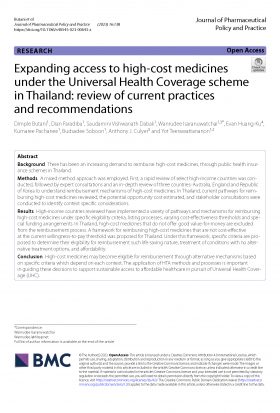This website uses cookies so that we can provide you with the best user experience possible. Cookie information is stored in your browser and performs functions such as recognising you when you return to our website and helping our team to understand which sections of the website you find most interesting and useful.
Expanding access to high-cost medicines under the Universal Health Coverage scheme in Thailand: review of current practices and recommendations

Details
There is a growing demand for public health insurance programmes to reimburse high-cost medicines, including those that do not represent good value-for-money. This demand is likely to inhibit financial sustainability, given the growth of new technologies and public demands for expanded access to care.
This study reviewed the experience of selected countries with established health technology assessment (HTA) systems and found that almost all have initiated special programmes or alternative mechanisms to fund high-cost, cost-ineffective medicines as they progress towards Universal Health Coverage (UHC).
We recommend no reimbursement for cost-ineffective medicines and reimbursement of other high-cost medicines only when they are the only life-saving option available to patients.
In such cases, contextual factors may be taken into account to determine the appropriate willingness-to-pay threshold and budget limits. Monitoring and evaluation of implementation arrangements will be critical for assessing the impact of these programmes.
Read more: https://joppp.biomedcentral.com/articles/10.1186/s40545-023-00643-z




